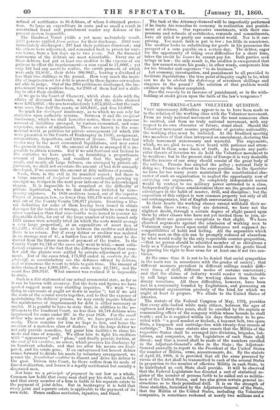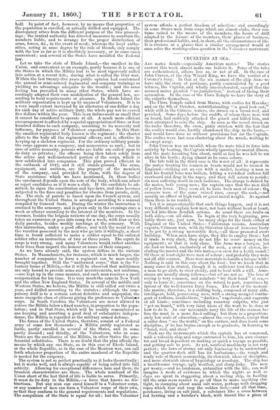THE WORKING-CLASS VOLUNTEER QUESTION.
VERY unnecessary difficulties appear to us to have been made as to the relation of the working class with the Volunteer movement.
From no truly national movement can the most numerous class
be omitted, and from no truly national movement, with any respect to its own character or future, stand aloof. Should the
Volunteer movement assume proportions of genuine nationality, the working class must be included. At the Bradford meeting two members of that class interposed an amendment, declaring the whole movement unnecessary and wasteful. The arguments, which, we are glad to see were heard with patience and atten- tion, had in them some basis of truth. As respects any parti- cular threats of invasion we do hold the Volunteer movement to be needless ; but in the present state of Europe it is very desirable that the reserve of our army should consist of the great body of the nation. Prussia has adopted the policy ; national Italy is
doing so ; France is almost in the same position. in the Spectator we have for too many years maintained the constitutional cha-
racter of such an organization to neglect the opportunity now of enforcing our arguments. No completely independent nation would be content to see military power entrusted to a class. Independently of these considerations there are the greatest moral advantages in the habit of muster, drill, and discipline ; but the exposition of this subject is now common property not only of all our contemporaries, but of English conversation at large.
In their hearts the working classes cannot withhold their as- sent from these views; they are deterred, we have not the slightest doubt, through a certain degree of slight passed upon them by other classes who have not yet invited them to join, al- though there are generous exceptions to that slight. We have observed arguments against the admission of working men to Volunteer corps based upon social differences and supposed in- compatibilities of habit and feeling. All the arguments which we have seen on this side can be promptly reduced ad absurdum by what would really be the only respectable counter-proposition, —that no person should be admitted member of so chivalrous a body as a Volunteer Corps unless he could show his gentle blood by proving his right to bear arms for at least one if not two cen- turies.
At the same time it is not to be denied that social sympathies in the main run in accordance with the grades of society ; that different manners prevalent in different callings render diffe- rent times of drill, different modes of costume convenient ; and that the claims of industry would render it undesirable to call large numbers of the working classes from the or- dinary vocations. All these difficulties, however, have been met in a community founded by Englishmen, and possessing an international organization precisely of the kind for Which we ought at least to prepare. We allude to the United States of America.
The statute of the Federal Congress of May, 1792, provides that every able-bodied white male citizen, between the acres of eighteen and forty-five years, shall be enrolled by the captain or commanding officer of the company within whose bounds he shall reside ; and he is required within six days thereafter to be pro- vided with " a good musket or firelock, a bayonet belt, two spare flints, a knapsack and cartridge-box with twenty-four rounds of cartridge." The same statute also enacts that the Militia of the respective States shall be arranged into divisions, brigades, bat- talions, and companies, as the Legislature of each State shall direct ; and that a record shall be made of the numbers enrolled in the Adjutant-General's office in the State ; the Adjutant- General annually to report to the President of the United States the number of Militia, arms, accoutrements, &c. By the statute of April 23, 1808, it is provided that all the arms procured by virtue of the Act shall be transmitted to each of the several States in proportion to the number of effective Militia in each State, to be distributed as each State shall provide. It will be observed that the Federal Legislature has directed a sort of statistical re- gister of the number of persons liable to be called out as militia- men of the United States, and has also given certain general in- structions as to their periodical drill. It is on the strength of these statistics, furnished by the Adjutants-General of the State, that the Militia of the United States, including the Volunteer companies, is sometimes reckoned at nearly two millions and a
half. In point of fact, however, by no means that proportion of the population is enrolled, or actually drilled and equipped. The discrepancy arises from the different purpose of the two proceed- ings: the central authority has directed measures to ascertain the numbers liable, and to arrange for the proper distribution of arms, forces, &c., in the event of need ; whereas the local autho- rities, acting in some degree by the rule of thumb, only comply with the law as far as it is absolutely necessary, or in some cases convenient; and several of the States have modified the Federal law.
Let us take the state of Rhode Island,—the smallest in the Union, and convenient as an example, partly because it is one of the States in which the Militia had to be most vigorously called into action at a recent date, during what is called the Derr war. Within the last twenty-five years public opinion had condemned the annual or semi-annual regimental and company trainings as yielding no advantage adequate to the trouble ; and the same feeling has prevailed in many other States, which have ac- cordingly adopted their own modification of the general law, ac- cording to local requirements or pleasure. In Rhode Island the military organization is kept up by means of Volunteers. It is to a very small extent increased by an allowance of one dollar a day for each day of active military duty, the whole pay not to exceed five dollars within the year. This is an inducement so small that it cannot be considered to operate at all. A much more efficient encouragement is afforded by a special appropriation of three or four hundred dollars to each company, according to its necessity and influence, for purposes of Volunteer expenditure. In this State the smallest regimental body known is the regiment ; the charter allots to the body all the regimental officers, and is effective in keeping up a skeleton regiment. For the ordinary military parade the corps appears as a company, and manoeuvres as such ; but in case of active necessity, persons who are liable are called upon to do duty as privates ; the officers being then taken solely from the active and well-instructed portion of the corps, which is now subdivided into companies. This plan proved efficient in the outbreak of 1842, and it still stands ground. The arms, equipment, and uniform, are the property of the members of the company, and provided by them, with the degree of State assistance which we have mentioned. In these bodies the enrolment depends upon the vote of the body, which can admit or reject candidates as if it were a club. If the candidate be ad- mitted, he signs the constitution and bye-laws' and thus becomes subjected to the fines and penalties for absence from parade, drill, &c. The style of parade is based upon the French system, and throughout the United States is arranged according to a manual compiled by General Scott. During the winter the instruction is confined to the armoury, and is given only in the evenings once a week or oftener according to the interest of the members. In the summer, besides the brigade reviews of one day, the corps usually takes an excursion or goes into camp for a week, with four or five daily parades, besides weekly meetings at the armoury. With this instruction, under a good officer, and with the usual love of the vocation possessed by the men who go into it willingly, a short time is found sufficient to make a soldier equal to the enlisted soldier after an instruction of two or three years. The esprit de corps is very strong, and many Volunteers would rather sacrifice their lives than imperil the honour or name of their company. As we have already said, the system differs in the various States. In Massachusetts, for instance, which is much larger, the number of companies to form a regiment can be more readily brought. together. Still the "uniformed corps," that is the Vo- lunteer forms of Militia,—for it will be observed that militiamen are only bound to provide arms and accoutrements, not uniforms, —are kept up in the same manner, and each man receives a small compensation for his time. It is very much the same in New York and the other New England States. In several of the middle and Western States we believe, the Militia is still called out twice a year, and drilled according to the statutes ; although the com- pulsory drill is to a certain extent defective and unpopular, the more energetic class of citizens giving the preference to Volunteer corps. In South Carolina the Volunteers are never allowed to reduce the Militia below a fixed number, in proportion to the popu- lation; and in that State, which will be readily remembered as one keeping and asserting a good deal of substantive indepen- dence, the Militia is regarded as the military armed defence.
The forces of the United States, therefore, consist of a Federal army of some few thousands ; a Militia partly registered as liable, partly enrolled in several of the States, and in some partly disused ; and thirdly, of the Volunteers, who in some States are the auxiliaries of the Militia, in other States the pre- ferential substitutes. There is no doubt that the plan affords the
means by which any one State, as in this case of Rhode Island, or the whole Republic, as in the case of the Mexican war' can call forth whatever proportion of the entire manhood of the Republic is needed for the exigency.
The system is not so perfect practically as it looks theoretically; but it works well, and is always capable of being called into full activity. Allowing for exceptional differences here and there, its broadest characteristics are these. The whole manhood of the Union short of the last third of life is liable to serve. Primarily, it must do its duty in the Militia,—a force that knows no dis- tinctions. But any man can enrol himself in a Volunteer corps, or any number of men can form a Volunteer corps of their own, so that they conform to the general requirements and regulations. The compulsion of the State is equal for all ; but the Volunteer system affords a perfect freedom of selection; and accordingly in some States men form corps which are almost clubs, their cos- tume suited to the means of the members, the hours of drill adapted to the leisure of the members, their places of business, their professional habits, and, in short, all the circumstances of life. It is obvious at a glance that a similar arrangement would at once solve the working-class question in the Volunteer movement.



























 Previous page
Previous page